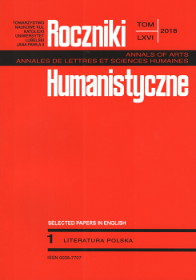In the Circle of the Tragic: The Book of Job. A Fragment of a Greater Fragment
In the Circle of the Tragic: The Book of Job. A Fragment of a Greater Fragment
Author(s): Andrzej TyszczykSubject(s): Language and Literature Studies, Studies of Literature, Polish Literature
Published by: Towarzystwo Naukowe KUL & Katolicki Uniwersytet Lubelski Jana Pawła II
Keywords: The Book of Job; The Book of Isaiah; tragic quality
Summary/Abstract: The Polish version of the article was published in “Roczniki Humanistyczne,” vol. 57 (2009), issue 1. Job’s drama that is equally a drama of existence and a drama of faith reveals the dimension that is in fact rarely seen in Greek tragedy, namely the transcendental tragic dimension. The identity tensions between the image of God whom Job accuses of cruelty and the image of the “defender in high” (go’el) mentioned by Job, one who would take the side of his suffering, at the same time testifying to the fact that Job was not guilty, opens the possibility of transformations blending the different images into a figure of transcendental tragic quality—based on a figure similar to the Greek figure of a tragic transfer—in which God, as the ultimate source of everything, including unjust misery, not only takes the side of human suffering but also experiences the suffering himself, revealing the analogy and then the interpretative identity of levels of human and divine experience of the tragic. The Book of Job is only the necessary starting point for the possible transformation of the image of God introducing a split of the image of God (the motif of go’el) in the book protagonist's complaint and deconstructing the category of “just retaliation.” The conditions that make transformation possible can be found in The Book of Isaiah, especially in the image of “The Lord’s Servant” and in Messianic interpretations of this picture closely connected with the phrase: “It was the Lord’s will to crush him with pain” (Is 53:10).
Journal: Roczniki Humanistyczne
- Issue Year: 66/2018
- Issue No: 1SP
- Page Range: 151-187
- Page Count: 37
- Language: English

